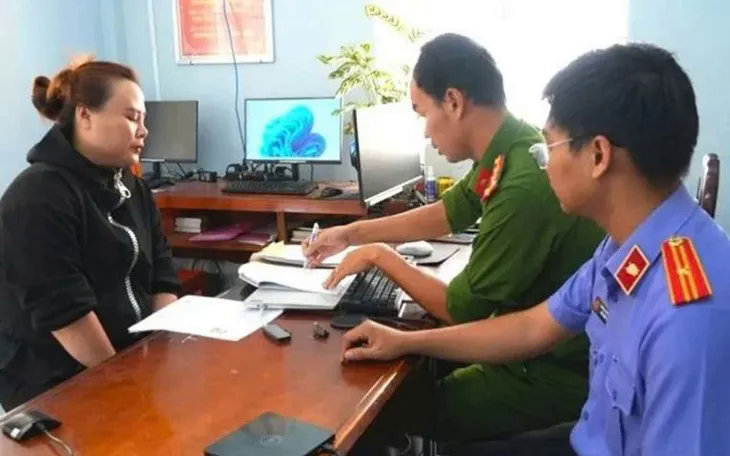E-commerce imports surge
In recent years, alongside the wave of digital transformation and the trend of fast, convenient, and cheap consumption, the cross-border e-commerce market in Vietnam has been growing at a breakneck pace. A plethora of consumer goods from China, Thailand, South Korea, and other countries are flooding the e-commerce channel in small quantities, in personal lots, and with minimal taxes.
As shared by a consumer with our reporters, items such as children’s headbands, kitchen knives, cleaning tools, mini fans, and facial cleansing devices are just a few clicks away on platforms like TikTok Shop, Shopee, and Temu. These products are immediately shipped from abroad and delivered to users within a week, at half the price of domestic goods. This is why many consumers are opting for this shopping method.

On average, more than 170,000 import orders are injected into the Vietnamese market daily.
According to the Customs Department, in 2024 alone, the country recorded over 62 million cross-border e-commerce orders, meaning that on average, more than 170,000 import orders are injected into the Vietnamese market daily. Notably, over 95% of these orders were valued at less than VND 1 million each, and almost all were classified as gifts or personal purchases, exempt from import tax.
In reality, imported goods through this channel are not merely for personal consumption, with values below VND 1 million. They mainly consist of cosmetics, clothing, household items, electronics, and accessories. Many individuals have exploited the “small-scale consumer goods” loophole to resell large quantities on social media and domestic e-commerce platforms or supply them to retail outlets.
“There are numerous cases of people bulk-buying from China, splitting the orders into smaller lots through e-commerce channels, and then reselling them on TikTok and Facebook,” said Ms. Nguyen Thu Ha, owner of a household goods manufacturing facility in Bac Ninh. “The prices are very low because they are not subject to taxes or quality inspections. This is suffocating small domestic manufacturing facilities.”
Domestic businesses are losing their home turf
According to economic expert Nguyen Minh Phong, imported goods through e-commerce are infiltrating almost all sectors that are strengths of Vietnamese enterprises, such as garment, household appliances, fashion accessories, and consumer electronics. This influx is causing difficulties for many domestic enterprises in consuming their products, especially small and medium-sized enterprises that already face capital, raw material, and production space pressures.
The representative of the Vietnam Association of Small and Medium Enterprises shared that many domestic enterprises are facing direct price competition from tax-exempt foreign goods, leading to a significant drop in orders, especially in the household appliances and garment industries, where they are losing market share to small imports from China and Thailand.
“We can’t compete with the low prices of imported goods. They don’t pay taxes, don’t incur domestic logistics costs, and aren’t burdened by warranties,” said Ms. Ha. “Meanwhile, we produce according to Vietnamese standards, provide insurance and social insurance for our workers, and yet we are at a disadvantage in our home market.”
Moreover, not only in terms of price but imported goods through e-commerce also dominate in terms of design and trend updates. Thanks to their global consumer data and flexible supply chains, Chinese and Thai manufacturers can quickly launch new models, while Vietnamese enterprises take an average of one to two months to research and produce similar products. This “lag” has caused many domestic brands, especially in the consumer goods, children’s fashion, and household appliance sectors, to be left behind in the “competitive spiral.”
Addressing the tax exemption loophole for small-volume imports
The convenience, low prices, and fast delivery of e-commerce imports are giving them a growing advantage. Notably, most of these orders are exempt from import taxes because they fall within the gift exemption threshold or are below the value limit specified in Circular No. 191/2015/TT-BTC and Decree No. 08/2015/ND-CP. According to the Vietnam Logistics Services Association, this is a significant loophole in tax policies, allowing organizations and individuals to commercialize imported goods as personal orders to evade taxes.
“Imported goods through e-commerce are creating an ‘underground flow’ that pressures the domestic supply chain. This is no longer a simple form of retail but has become a competitive distribution channel against Vietnamese manufacturers,” said Mr. Tran Thanh Hai, Deputy Director of the Import-Export Department (Ministry of Industry and Trade). “In the context of the Government’s efforts to promote domestic production and enhance Vietnam’s value chain, it is essential to review the tax exemption policy for e-commerce imports.”
Mr. Phong also emphasized that the boom in cross-border e-commerce poses increasing challenges for domestic production. In this context, considering removing tax barriers for e-commerce imports is not just about increasing budget revenues but also about safeguarding domestic production in the long run.
Recently, in its contributions to the Ministry of Finance’s draft decree on customs management of exported and imported goods traded through e-commerce, the Vietnam Chamber of Commerce and Industry (VCCI) opined that the exemption of import tax on low-value orders (up to VND 1 million) is inappropriate and may create inequality with domestically produced goods.
According to VCCI’s analysis, most imported goods will be exempt from import tax because the value of each e-commerce order is usually low, typically not exceeding VND 1 million. In 2024, more than 324.1 million imported products were sold on the Shopee platform, generating revenue of VND 14.2 trillion, equivalent to an average of only VND 43,682 per product. Thus, setting the threshold at VND 1 million means that most e-commerce imports will not incur import taxes.
At the same time, VCCI emphasized that this regulation creates inequality with domestically produced goods. Domestic enterprises have to pay import taxes on raw materials imported for production, while e-commerce imports are entirely exempt. This inadvertently creates tax policy inequality, giving foreign goods a competitive advantage. Therefore, a comprehensive import tax policy that does not exempt e-commerce imports should be considered.
Additionally, the Ministry of Finance’s draft decree intends to exempt permits, conditions, and specialized inspections for imported goods valued at up to VND 1 million but with an annual total value not exceeding VND 48 million for each organization or individual. VCCI believes that this regulation is designed from the perspective of the importer and is inconsistent with the nature of e-commerce, potentially creating policy loopholes.
“The VND 1 million threshold is almost ineffective, as most imported goods today have low values. Consequently, most e-commerce goods will not require permits or specialized inspections, even if the total sales value in Vietnam could be substantial, creating inequality with domestic goods,” VCCI emphasized./.
A Billionaire’s Unexpected Proposal: Premier Tran Dinh Long’s Surprising Remarks on Resolution 68 and Public Investment Projects
On May 31, Prime Minister Pham Minh Chinh hosted a dialogue with businesses and business associations in Hanoi, Vietnam, to discuss the effective implementation of Resolution 68-NQ/TW on private sector development. The event was also attended by Deputy Prime Ministers Tran Hong Ha and Ho Duc Phoc, along with leaders from various central ministries and sectors.
Billionaire Tran Dinh Long: ‘Outsourcing Expedites, But Homegrown Manufacturing Protects Our Railway Industry’
“The North-South high-speed railway is a once-in-a-millennium opportunity,” asserts Tran Dinh Long, Chairman of Hoa Phat Group. He emphasizes that while engaging foreign contractors could expedite the project, nurturing the domestic railway industry and promoting local production are paramount.
The Automotive Supply in Vietnam Surges to a Record High, with Numerous Models on Significant Discounts
“An extraordinary opportunity awaits car enthusiasts! For a limited time, take advantage of incredible discounts of up to VND 500 million on select automobile models. Upgrade your ride and experience the thrill of hitting the open road in style.”





















